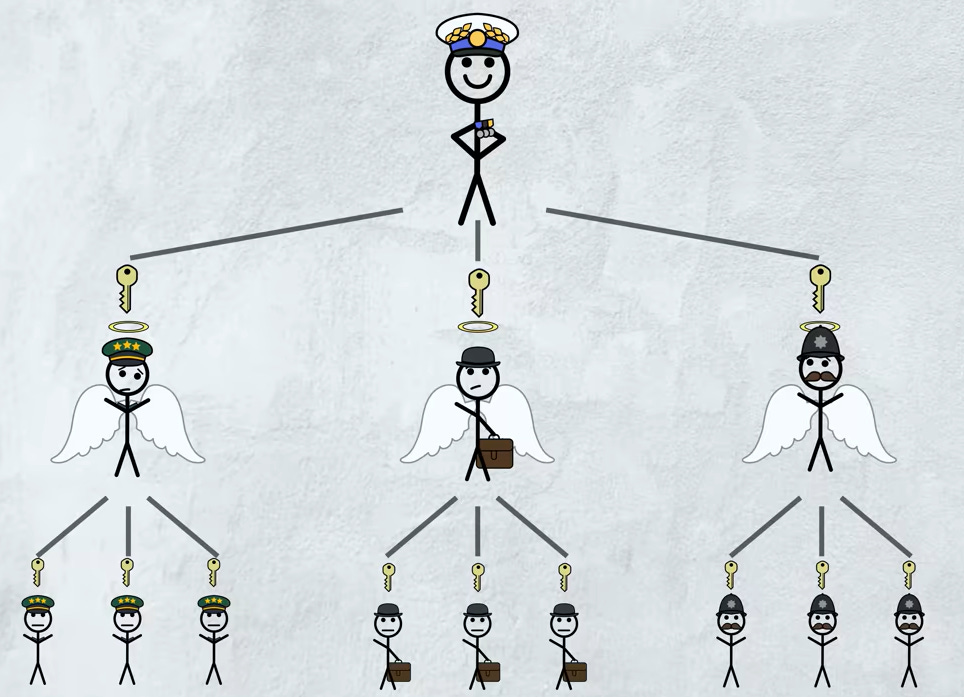Pt4: Power Hierarchies
benedict arnold, margot robbie, and cult leaders
I had a lot of misconceptions about history, which I’m now realizing after starting to read a bunch of history. I sort of thought, vaguely, that kings were absolute, and just told people what to do and then people did it.
But no - the position of kings have been quite tenuous; if they don’t keep their councils happy they might get replaced, or they might just get stabbed a lot if they don’t pay the army enough. Being a Roman emperor seems cool but after I learned about every single emperor (shoutout to History of Rome), my feelings switched to “you could not pay me to sit on that throne.”
You may have seen CGP Grey’s fantastic video Rules for Rulers. I’ll summarize the first part briefly:
If you want to rule, you need help from others, because you can’t defend the kingdom or build roads or collect taxes by yourself. Those that help you - people who run the military, control the finances, etc - are your keys to power. They will help you because you pay them, using treasure you’ve gathered from your kingdom.
Your primary job is raising and distributing the treasure. The thing that makes you truly king, in a sense, is being the first one through whom the treasure passes.
You must give your keys more treasure than your rival might promise; if they’d do better in a rival regime, they are in danger of switching sides and betraying you. You must keep your keys as happy as possible; every bit you spend directly on your kingdom is not spent on keeping your keys loyal, and a rival now has more to promise them. They won’t spend that treasure directly on the kingdom, they’ll give it to you.
So, you have an incentive to minimize your keys. Fewer keys, the more treasure you can grant each of them, the more loyal they are. This is why dictators will often purge their previous keys after a coup; they needed those keys to get in power, but those keys are no longer useful once the dictator has power.
Your keys have the exact same dynamic, just repeated one level down. It’s a big fractal, where each person is using their resources to keep their subordinates happy, and is looking to maximize resources gained from their boss (by being useful and necessary to their boss). If they’re not getting enough resources, they then have less to pass to their own keys, which makes their keys unhappy and puts them at risk of getting overthrown.
Let’s take a moment to remember Benedict Arnold.
He was kinda cool, actually. When he was a kid, he had two siblings die and then his dad turned to alcoholism and drank away the family money, and he ended up supporting his family. He founded a business and was doing pretty well when the revolutionary war started. Then his wife died. He stood out in the military, was very skilled, and heroic, and got a leg blown to bits while going off and being brave. He got passed over for promotions he deserved, the positions going instead to other people who congress was trying to politically favor. He kept trying to resign about it, but Washington was like ‘no stay we need you.’ Arnold was grouchy about everything, while continually doing more heroism and also getting wounded in the same leg a lot somehow. After a fight, one of his superiors stripped him of command. Arnold went and led his army into battle anyway, and managed to pull off an incredible victory. The commander who relieved him took credit for this, and everybody hailed the thieving commander as a hero. They were like ‘maybe this guy should replace Washington!’ while Arnold stood on the sidelines, presumably looking like this:
Honestly, I might have turned traitor too.
Arnold, as a key, was being insufficiently rewarded for the value he was providing. He should have been climbing ranks, but was continually denied.
So he looked over and was like, “I could probably do better over there.”
You can coup and overthrow the leader, replace them with someone who will treat you better. Or, you can defect to a different hierarchy altogether!
Status works the exact same way. When people are confused about what exactly causes someone to be high status, they should actually be asking the question what status hierarchy are we in? The more you have what other people want, and the more people know you have it, the higher you rise in the ranks - but which ranks you’re in depends on which people want what you have. More on that in a second.
You make a hit song and suddenly find yourself invited to the party of a famous musician - you have become valuable to a higher ranked player. That value is channeled up through you by your fans below you; by acquiring you as a key (friend, ally), the famous musician then secures all the subordinates below you, too. Even if your subordinates aren’t fans of the famous musician, they are loyal to you, and you can offer them up in exchange for favor.
This can look like a lot of things - you signal boost Famous Musician’s tour to your fans, your fanbase gets you noticed by the Today Show and now you have handy connections for Famous Musician, you can start talking about how cool the Famous Musician is and then improve their reputation to a wide audience, etc.
These hierarchies are most obvious when the gaps between ranks are wide. The closer to the tail end you get, the fewer people there are, and like stars in the sky the chasm makes it extremely apparent exactly where you rank. Who’s higher status, Margo Robbie or that redheaded girl who played Jon Snow’s love interest in Game of Thrones? Both are successful actors, but obviously it’s Margot Robbie. Now - who’s higher status, the guy who manages the grocery store nearest you, or your coolest cousin? You could probably make a guess, but it might not be obvious, and you could likely argue “it depends” on a lot of stuff. Most people you’ll meet are of similar enough rank that the differences are hard to see, and so it can be easy to believe that you ‘don’t see status.’
I used to truly believe I was status-immune, that I treated everyone equally no matter their rank - but this was a luxury I could only hold in a world where everyone around me varied by only miniscule degrees in status, and their hierarchies intertwined with a lot of confusing plausible deniability.
You never compete on only one hierarchy. Some hierarchies are bigger than others, some overlap less or more - but there’s always multiple games to play. The tabletop nerd group that meets up weekly near you might find Javier Dominguez, most recent world champion of Magic the Gathering, to be a near-idol, whereas you personally might find little value in his approval at all, and go ‘oh neat’ casually, your body fully relaxed, when you accidentally run into him at a party. You don’t care about that hierarchy, because your own friends don’t care. Gaining his approval would gain you no power in the hierarchies you care about.
But both you and the local tabletop nerd group, despite your differences, would almost certainly find Margot Robbie high status! She is highly ranked in an extremely large hierarchy that spans a huge amount of people, and downstream of her lies both you and the nerds alike. Mind that ‘lots of people want her approval’ isn’t the only thing here - it has to be people whose opinions you care about. Those are the people who would find you cool if you became friends with her.
In small suburban worlds where everyone is average, there’s a lot of plausible deniability in rank because people distribute their worth across hierarchies. Sure, your local grocery store manager might seem lame, but maybe he’s really warm and kind, a wonderful family man! And your coolest cousin is super good at dollhouse building, she got a state award for it once! How can you compare them, really? Everyone has something to offer! Every person in your friend group is separate but somehow still equal! All the hierarchies people are competing on are so overlapping and blurred together that nobody really seems higher status than another on an absolute level.
But often the way people in small suburban worlds have status competitions is by trying to pull other people into the hierarchies they do better at. Your friend suggests you all watch a movie that’s from a genre they know a lot about, thus getting everyone to invest microscopically in a hierarchy they’re confident in. People share fun facts from their field of expertise, implicitly setting up a frame that these facts are worth caring about and the expert is the source of this value. You don’t do well in STEM, so you downplay how important STEM is and talk at length about how important literature is to the world. A huge amount of socializing is fighting in tiny micro wars over which hierarchies people should care about, and they are, almost without fail, hierarchies the speakers rank higher in than the listeners.
You can also just switch hierarchies into ones you have comparative advantages at, much like Benedict Arnold. If you’re good at chess, you might go play a lot of chess. Your aversion to looking goofy when trying to learn a new skill is aversion to joining a hierarchy in which you rank on the bottom. Finding or creating hierarchies which reward the joiners for something easily-accessible (like wearing the right clothes) is largely what teens are doing; when we say they’re trying to ‘fit in’.
Hierarchy competition happens to me in polyamory! I find that when my partner starts seeing a new girl, I immediately have to figure out what hierarchies she’s good at, in my partner’s eyes. I ask “What do you like about her more than me, and what do you like about me more than her?” He tells me, and I feel my whole body soothe. Ah - it’s true, she’s way better at giving compliments than I am! But at least I’m better at snuggles than she is. I have assured myself that my boyfriend has at least one reason to keep me around, and thus my jealousybrain is settled. I am most threatened by metamours when they are very similar to me. The more a girl’s status encroaches into the territory I am good at playing, the more competitive I feel. I am ok losing to her as long as I can also win somewhere else.
I also think our sense of identity in itself is largely downstream of hierarchy competitions.
I’ve always been troubled by the fact that my sense of self seems so based on context. I am stupid among my smart friends, and smart among those on the street. I am good at introspection, but would be terrible if transported to an alien planet where their entire evolutionary history revolved around introspective skill. How do I make sense of myself, then, if I’m but a reaction to my environment? I watch myself scrolling tiktok and watching a video of a garbage truck unloading. I think garbage trucks are really cool, but I am dimly aware that I like the idea of being a weird girl who likes watching garbage trucks. I think somehow this would raise my status. Would I still be watching these videos in a culture where it actually made me low status? Probably not! How many of my preferences are genuinely mine, as opposed to some elaborate psychological strategy to feel socially safe? Even when I like things that are ‘low status’ I feel cool for seeming ‘immune to status’, which… is high status. So who am I? Is my entire identity just strategy all the way down?
(Mostly, but not entirely - will get into this in an upcoming post)
Our formative years is a process of figuring out what hierarchies are around us, learning which ones we find delight in, and then trying out the ones we might succeed at. Long legs run fast? Join track team. Really feminine? Hoorah, there’s an infinite array of cottagecore dresses for you to purchase. Sloppy, low conscientiousness? You’re in luck, stoner iconography is cool and you should make friends who find it cool.
For most people, most thoughts about yourself are subtle, subconscious nudges figuring out narratives that reinforce your desired position in all your hierarchies. Going to mail postage, you notice you’re a little faster at rifling through your wallet than the other people in line, and feel a tiny, near-invisible hit of pride? Step on all the cracks in the sidewalk intentionally, are you autistic [read: cool in your community]? Your choices of food, of clothing, of books to read - all of them are influenced by status competitions. I read a niche book, I feel cool about being the kind of person who accumulates rare, independent knowledge. I read a popular book, I feel cool about being the kind of person who doesn’t care about being cool and will read stuff if it’s good regardless of signaling. Don’t you wanna be friends with someone like that?
While I think much of identity is figuring out ways to socially position yourself into value, I want to be clear that a great deal of status maneuvering is making sure you are low status. I’ll talk about this - and what determines people’s choices to make high vs low plays - later.
But I do wonder to what extent depression and anxiety are simply natural human reactions to feeling low status. While it’s true my default state is naturally very low anxiety (I just witnessed myself insert this phrase because I was afraid you’d perceive me as high anxiety and thus like me less), I’ve always been high in social anxiety. It’s been amazing to watch the social anxiety melt away as I’ve risen in status, when socializing with those lower status than me. I feel confident, bold, at ease saying whatever’s on my mind. I’m not worried at all. Once I realized this, I was like, holy shit, was all my social anxiety in the past just some primal status-stress?
For a while I was slightly discomforted at why I thought cults were bad. Much of what we find bad is just downstream of ever-changing norms; people in history regularly experienced the equivalent of modern-day abuse without really seeming upset by it. Who am I to say cults are damaging if the people inside the cults insist no, really, this is good for me? Am I really gonna say ‘actually no, I know what’s better for you.’
It does seem a little weird that people seem fine inside of cults, maybe even doing actively great, and then suddenly go ‘oh god i’m traumatized’ once they get out of them. I personally was fine* in my childhood, and then when I got out into the world and people were like ‘oh god you poor thing’, that’s when the real trauma started. Are we just telling ex-cult members they should be traumatized, and they internalize this?
Maybe, but I don’t think it’s entirely relative. I think a lot of the issues come from the fact that cults strip away as many other hierarchies as they can besides that beneath the leader.
This is what toxic power is - not just being on the throne, but trying to cut off a subordinate’s allegiance to all other thrones. A subordinate with many gods has their resources more divided in worship; a jealous god will command thou shall have no other gods before him.
In a cult, you’re isolated from the outside world, and thus removed from competing in hierarchies like work, family, or hobbies. This is important - if you want the approval from people not inside the cult, then your loyalties are split, you are influenced by others. And normally, being influenced by a wide variety of things is normal! You want to look sexy and also get promoted and also make good jokes to your funny friends and post online about your skateboarding and be a fan of a niche sci-fi tv show.
In the normal world, people have many avenues to acquire power, a sense of self worth, and an independent identity. This keeps exploitation - a word I rarely use - in check. If someone above you begins trying to demand too much while giving too little in return, we all collectively lose it. The desire to tear down those at the top of hierarchies is a near pathological drive, and you can see it in almost every single social commentary video on youtube. In a way it’s sorta self-balancing; the more powerful you get, the less tolerance the cancel-hungry masses have for any slip-ups. It’s a brutal form of accountability that has a lot of downsides, but at least strives to hand power to those at the bottom of the ladder. (this is in itself a status maneuver! again, more on that later)
But cults are not normal.
Cults are the equivalent of a dictator removing voting power, shutting down the internet, outlawing discourse. Of course they don’t do this explicitly, but rather set up environments that shut down access to other hierarchies that might threaten to undermine him at all - and of course justify this isolation as being a gift, actually (only the special are accepted) and important for some greater, lofty goal (greatness requires sacrifice).
A cult is a system of careful hierarchy management. A malevolent guru succeeds by carefully, cleverly stripping out status from people below who attempt to climb (keeping them infighting, structuring a belief system such that they have innate access to the top in ways other people don’t, punishing others’ self-trust as prideful, etc). He gains the most benefit from others’ service, often at their expense.
From this lens, of course leaving a cult is traumatizing. You switch from competing in a narrowed game where your play served to elevate others at your own expense, to suddenly being thrust into a vast world of many hierarchies, barely any of which you are good at, as you’ve spent so much of your time and effort into a separate thing the normal world doesn’t care about.
In addition to this, there’s betrayal. For example, most child sexual assault is not traumatizing or upsetting to the child at the time, it’s after the child grows up and realizes the context that the trauma sets in. This context is usually the realization that: someone who was supposed to protect me, was in fact doing something they had good reason to believe would harm me. It’s the sensation of being used, of having trust betrayed.
It makes sense that it’s so hard to leave. I’m not sure I would have the power to switch hierarchies downwards, while realizing I’ve been betrayed too!
(I’ve talked before about how cult leaders use frame control - you can also look at frame control as a consistent, subtle remaneuvering of other people into your hierarchy, and a consistent refusal to engage in theirs - that would be a frame where they have something you want, and thus power over you. Unacceptable!)







I have a less flattering interpretation of people being 'traumatized' leaving cults. They leave an old status hierarchy for a new one - one in which cults and cult leaders are *low status.* It's not about complexity at all. If someone leaves Islam for a new more restricted and simple social circle in which Islam is low status, I predict they'll call themselves traumatized if they lean towards framing things that way. Islamic societies are big and complex things, but that's not particularly relevant.
People don't like having status ripped away from them, at all. Similar story for people getting dumped and then deciding they are 'traumatized.' You invest in something that you subconsciously thought was raising your status and then it gets inverted.
In theory this argument could be hard to falsify. Maybe someone says 'Squid, you value status a lot'. I say I disagree, and claim I do not value status very much. The person could then say 'well actually Squid, the fact that you do not pursue status and make a point of saying that you do not pursue status to strangers is actually evidence that you do care about status a lot, because you make it a point to note that your mediocre status is a result of a lack of effort rather than failure'. This argument could be true, but in this world there is nothing I would be able to do to show that I actually authentically do not value status much.
However, these articles have still been cool and good. I think maybe there are three important factors that go into status that are important to parse out.
The first factor maybe is how much esteem you hold a person in based on your values. Some people value intelligence a lot. Other people value wealth a lot. Other people might value loyalty, reliability, or trustworthiness more. Some people might be mostly superficial and mostly value looks. Someone who values intelligence a lot might more naturally think of Elon Musk as high status, while a looks centered person might more naturally think of Kim Kardashian as high status.
The second factor is maybe how your broader social group views the person. If you do not value looks very much, but you happen to have a friend group that all views Kim Kardashian as high status, maybe you end up viewing her as somewhat high status yourself. If you like some mother you met at the PTA, but your mother friend group thinks that she is trashy and low status, maybe you grow to view her as trashy and low status yourself.
The third factor is literal status. In a friend group, the group will create an invisible agreed upon hierarchy, with some people at the top, and other people at the bottom. People will try to be coy about the hierarchy, but it will be there. Society also does this: it is generally universally agreed upon that the McKinsey consultant is higher status than the truck driver.
The tricky part is for me how much esteem I hold a person in (the first factor) has little to do with how my social group views them (the second factor) or their literal status (the third factor). I suspect there might be a gendered difference with this: women are more attracted to status signals in men than men are in women (a woman with a hot face who carries herself like a zero confidence loser will do better dating wise that a man with a hot face that does this around women), and so maybe for the average woman esteem is just more connected to social consensus and status than it is for the average man.